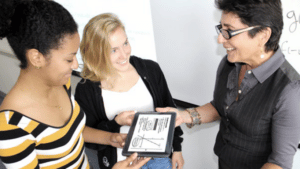Geolmary Suazo admits to being anxious before taking her first math class at Broward College in Florida. “I thought it was going to be very hard, and I remembered that I had a classmate tell me that it was the third time she was taking the course,” said Suazo. She is not alone. Many students worry about taking and succeeding in the gateway math courses needed to enter most community college degree and certificate programs. Their concern is not surprising given that these courses have traditionally had some of the highest failure and withdrawal rates at community colleges, in many cases disproportionately affecting poverty-impacted and racially minoritized students.
As part of ongoing efforts to improve student success rates in gateway math courses, a cross-section of mathematics faculty across community colleges participating in the Every Learner Network initiative sought to implement adaptive courseware to support students. Their experience suggests that adaptive courseware has benefits across the full spectrum of ability levels — from self-guided remediation and support for struggling students to helping reinforce skills for those who are ready for college-level content. A common strength is the technology’s ability to provide guided practice outside of the classroom setting.
Value Add: Integrating Adaptive Learning in Mathematics
Gateway math courses have traditionally had some of the highest failure and withdrawal rates at community colleges, prompting various reform efforts to help more students succeed in these foundational courses. This case study examines the efforts of seven ATD Network colleges participating in the Every Learner Everywhere initiative to implement adaptive courseware into gateway math courses to address the diversity of students’ needs. The study suggests that adaptive courseware provided needed corequisite and/or basic skills support and valuable guided practice outside of the classroom setting.
Download the case studyThe case study, which is being released today, is part of a series of 12 case studies examining the use of adaptive courseware in gateway courses that ATD is producing as a partner in the Every Learner network. The effort to improve student success in gateway math courses involved seven ATD Network colleges in Florida, Ohio, and Texas.
Key Takeaways
- Adaptive courseware provided needed corequisite and/or basic skills support, particularly at institutions which had eliminated developmental education courses as part of state-level or institutional reforms.
- Faculty leadership in identifying and deploying adaptive courseware was critical, particularly given the importance of ensuring that the courseware aligned with curricula and classroom lectures, activities, and assessments.
- Faculty and students stressed the importance of introducing students to courseware, regularly monitoring the student performance data it generates to target class content and individual interventions, and aligning courseware with out-of-class supports such as tutoring or corequisite labs.
- Scaling the use of courseware often focused on providing a consistent integrated experience across course sections taught by full-time and adjunct faculty.
